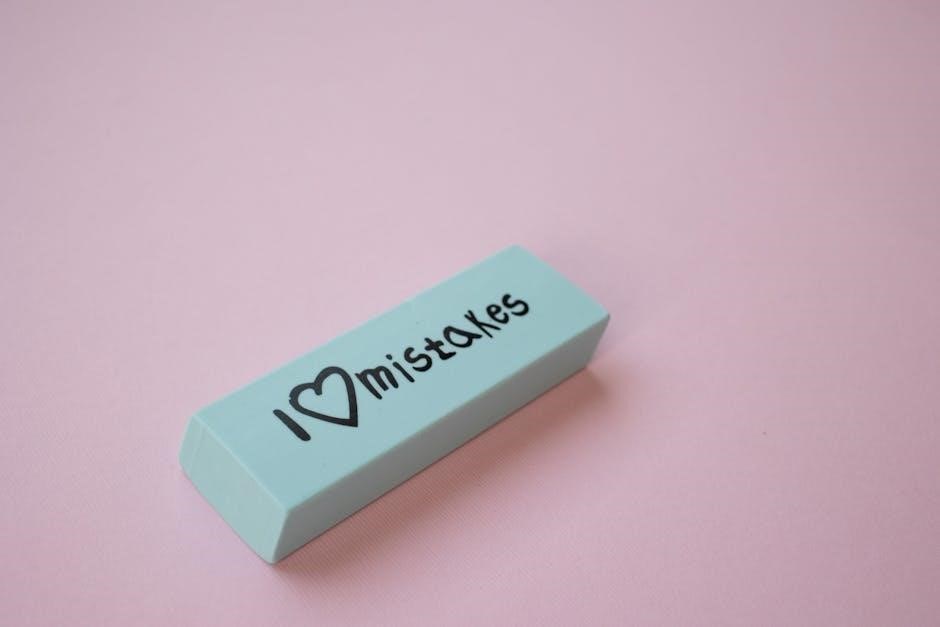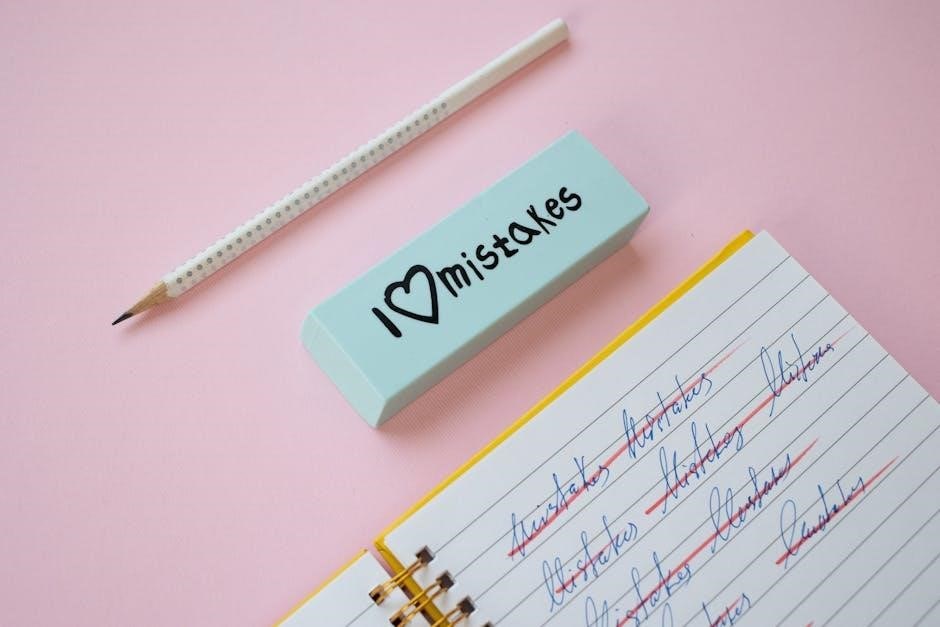This book by Carol Tavris and Elliot Aronson explores the psychology of self-justification, revealing how cognitive dissonance drives us to deny our mistakes and flawed decisions.
1.1 Overview of the Book and Its Authors
Mistakes Were Made (But Not by Me) is a compelling exploration of self-justification by psychologists Carol Tavris and Elliot Aronson. Tavris, a specialist in cognitive dissonance, and Aronson, a pioneer in social psychology, combine research and real-life examples to explain why people justify flawed decisions. The book offers insights into human behavior, revealing how we avoid admitting mistakes to maintain self-esteem, often at great personal and societal cost.
1.2 The Psychology Behind Self-Justification
Self-justification arises from cognitive dissonance, a mental discomfort felt when actions conflict with self-image. To alleviate this, individuals rationalize mistakes, shifting blame or denying responsibility. This psychological mechanism protects self-esteem but hinders growth, as it prevents honest reflection and learning from errors. The book delves into how this phenomenon perpetuates flawed behaviors and relationships, offering a deeper understanding of human rationalization strategies.
1.3 Importance of Understanding Cognitive Dissonance
Cognitive dissonance is a mental discomfort caused by conflicting beliefs or actions. Recognizing this helps address self-deception and promotes personal growth. It explains how we justify mistakes, affecting relationships and decisions. Understanding it is key to overcoming biases and fostering accountability.

The Concept of Cognitive Dissonance
Cognitive dissonance is a psychological concept describing mental discomfort caused by conflicting thoughts or actions. It drives self-justification and shapes behavior.
2.1 Definition and Explanation
Cognitive dissonance is psychological tension arising from conflicting thoughts, beliefs, or actions. It occurs when behavior contradicts self-image, causing discomfort. This discomfort motivates individuals to align their behavior with beliefs, often through self-justification or rationalization, as explored in “Mistakes Were Made (But Not by Me).” This concept is central to understanding why people deny their errors and maintain flawed decisions, as highlighted in the book.
2.2 How Cognitive Dissonance Leads to Self-Justification
Cognitive dissonance triggers discomfort when actions conflict with beliefs. To reduce this tension, individuals employ self-justification, altering perceptions or behaviors. This psychological mechanism helps maintain a consistent self-image, as explored in “Mistakes Were Made (But Not by Me).” Self-justification often involves rationalizing mistakes or blaming external factors, thereby avoiding accountability and preserving ego integrity.
2.3 Real-World Examples of Cognitive Dissonance
Examples include smokers denying health risks, consumers justifying expensive purchases, and individuals maintaining harmful relationships despite red flags. As discussed in “Mistakes Were Made (But Not by Me),” such behaviors highlight how cognitive dissonance leads to self-justification, protecting one’s ego while perpetuating flawed decisions.
The Role of Memory in Self-Justification
Memories, often selective and biased, shape perceptions and justify past actions. Inaccurate recall distorts decisions, reinforcing self-image and avoiding cognitive dissonance, as explored in the book.
3.1 How Memories Shape Our Perceptions
Memories significantly influence our perceptions by filtering experiences through personal biases and emotions. They often become selective, emphasizing events that align with our self-image while omitting contradictory details. This selective recall distorts reality, shaping beliefs and decisions. As the book highlights, such distortions reinforce self-justification, making it harder to acknowledge mistakes and fostering a skewed view of past actions and their consequences, which further entrenches cognitive dissonance.
3.2 The Inaccuracy of Human Memory

Human memory is not a reliable storage system but a reconstructive process prone to errors. Emotions, biases, and external suggestions often alter recollections, leading to distorted memories. These inaccuracies further complicate self-reflection, as people may unknowingly distort past events to align with their current beliefs, making it harder to confront mistakes and fostering a disconnect between actual experiences and remembered realities.
3.3 Memory Distortion and Its Impact on Decision-Making
Distorted memories significantly influence decision-making by altering perceptions of past events. When memories are inaccurate, they can lead to flawed conclusions and poor choices. Cognitive biases further exacerbate this issue, as people often recall information selectively to justify their actions. This distortion not only hinders personal growth but also perpetuates cycles of self-justification, making it difficult to acknowledge and learn from mistakes effectively, as discussed in “Mistakes Were Made (But Not by Me).”
The Impact on Relationships and Communication
Self-justification strains relationships by creating defensiveness and hindering accountability, while fostering empathy and active listening can bridge gaps and promote understanding in interpersonal dynamics.
4.1 How Self-Justification Affects Interpersonal Relationships
Self-justification fosters defensiveness, preventing individuals from acknowledging mistakes, which can escalate conflicts and hinder constructive dialogue. This mindset often leads to misunderstandings, emotional distance, and erosion of trust in relationships.
4.2 Communication Strategies to Overcome Self-Justification
Active listening, empathy, and open-ended questions can help individuals move beyond defensiveness. Encouraging a non-confrontational dialogue and fostering mutual understanding are key strategies to address self-justification effectively in relationships.
4.3 Case Studies of Improved Relationships Through Self-Awareness
Case studies reveal that acknowledging mistakes and embracing self-awareness can significantly mend strained relationships. For instance, couples who openly discuss their errors and biases often rebuild trust. Similarly, workplaces that encourage accountability see improved collaboration. These examples highlight how self-awareness fosters empathy and mutual understanding, leading to stronger, more resilient relationships.

The Consequences of Refusing to Admit Mistakes
Refusing to admit mistakes leads to strained relationships, eroded trust, and stalled personal growth, ultimately hindering both individual and organizational progress.
5.1 The Ripple Effect of Unaddressed Mistakes
Unaddressed mistakes create a ripple effect, eroding trust, fostering communication breakdowns, and leading to poor decision-making. This cycle exacerbates conflicts, strains relationships, and hinders personal and professional growth, emphasizing the need for accountability to mitigate such consequences.

5.2 The Role of Accountability in Personal Growth
Accountability serves as a cornerstone for personal growth, enabling individuals to acknowledge and learn from mistakes. By embracing responsibility, people cultivate self-awareness, foster resilience, and build integrity, leading to meaningful self-improvement and stronger relationships.
5.3 Historical Examples of Unacknowledged Errors
History is rife with instances where refusal to admit mistakes led to dire consequences. The Tuskegee Syphilis Study and the Chernobyl disaster exemplify how unacknowledged errors exacerbated harm. Leaders often denied responsibility, worsening societal trust and prolonging suffering. These cases highlight the importance of accountability in preventing compounded harm and fostering learning from past failures.

Strategies for Overcoming Self-Justification
Recognizing cognitive biases, fostering empathy, and practicing accountability are key strategies to combat self-justification. These techniques help individuals acknowledge mistakes, promoting personal and societal growth through honest reflection.
6.1 Techniques for Recognizing Cognitive Biases
Active self-reflection and open-mindedness are crucial for identifying cognitive biases. Practices like journaling, seeking diverse perspectives, and mindfulness can enhance awareness, helping individuals recognize distortions in their thinking patterns and decision-making processes, fostering a more objective approach to self-justification and error recognition. By acknowledging these biases, individuals can take the first steps toward overcoming them and making more balanced choices. This process not only improves personal growth but also strengthens interpersonal relationships by promoting empathy and understanding. Furthermore, education and exposure to different viewpoints play a significant role in equipping individuals with the tools needed to challenge their own biases effectively, leading to greater self-awareness and accountability.
6.2 Practical Steps to Acknowledge and Learn from Mistakes
- Create a safe environment for self-reflection to openly confront errors without defensiveness.
- Promote accountability by taking responsibility for actions and their consequences.
- Encourage open communication to gather honest feedback and understand different perspectives.
- Document mistakes to analyze patterns and identify root causes.
- Use educational resources to learn about cognitive biases and self-justification.
- Seek guidance from mentors or professionals to develop personalized strategies for growth.
- Foster a growth mindset to view mistakes as opportunities for improvement rather than failures.
6.3 The Role of Education in Promoting Self-Awareness
Educational tools and resources, such as the book “Mistakes Were Made (But Not by Me),” play a crucial role in fostering self-awareness by exploring cognitive biases and self-justification. By teaching individuals to recognize and challenge their own biases, education empowers personal growth and accountability. It encourages critical thinking and reflective practices, essential for understanding the psychology behind decision-making and behavior. This awareness helps individuals embrace mistakes as learning opportunities, leading to greater emotional intelligence and maturity.

The Book’s Relevance in Modern Society
The book’s exploration of cognitive dissonance and self-justification remains highly relevant, offering insights into modern challenges like misinformation, polarization, and decision-making in personal and professional realms.
7.1 Applications in Business and Leadership
The book’s insights into cognitive dissonance and self-justification are invaluable for leaders, offering strategies to acknowledge and learn from mistakes, fostering accountability and integrity in decision-making.
7.2 Implications for Personal and Professional Development
Recognizing self-justification patterns fosters personal growth by enhancing self-awareness and emotional intelligence. By addressing cognitive dissonance, individuals can improve decision-making, relationships, and accountability, leading to stronger professional and personal connections.
7.3 Reviews and Recommendations for the Book
Readers praise “Mistakes Were Made” for its insightful exploration of cognitive biases and self-justification. Many recommend it for its practical advice on personal and professional development. Available as a free PDF, the book is a valuable resource for understanding human behavior and fostering accountability.
Emphasizing self-reflection and accountability, the book concludes by urging readers to confront mistakes, fostering meaningful personal and societal growth through understanding cognitive dissonance and bias.
8.1 Summary of Key Concepts
The book explores how self-justification and cognitive dissonance lead individuals to deny mistakes, distort memories, and cling to flawed beliefs. It highlights the psychology behind maintaining self-image, the inaccuracy of human memory, and the consequences of refusing accountability. By understanding these mechanisms, readers can foster personal growth, improve relationships, and develop strategies to overcome biases and embrace responsibility for their actions and decisions.
8.2 The Importance of Self-Reflection in a Modern World
Self-reflection is crucial in today’s fast-paced society, where admitting mistakes is often discouraged. By acknowledging errors, individuals can challenge biases, foster empathy, and build stronger relationships. The book emphasizes that self-awareness is not a sign of weakness but a strength, enabling personal and professional growth in an increasingly complex world where accountability and humility are essential for progress and understanding.
8.3 Encouragement to Embrace Accountability
Embracing accountability fosters trust and integrity in both personal and professional spheres. By owning up to mistakes, individuals can learn and grow, leading to better decision-making and stronger relationships. The book underscores that accountability is not about blame but about taking responsibility, which is vital for personal development and societal progress in today’s interconnected world.